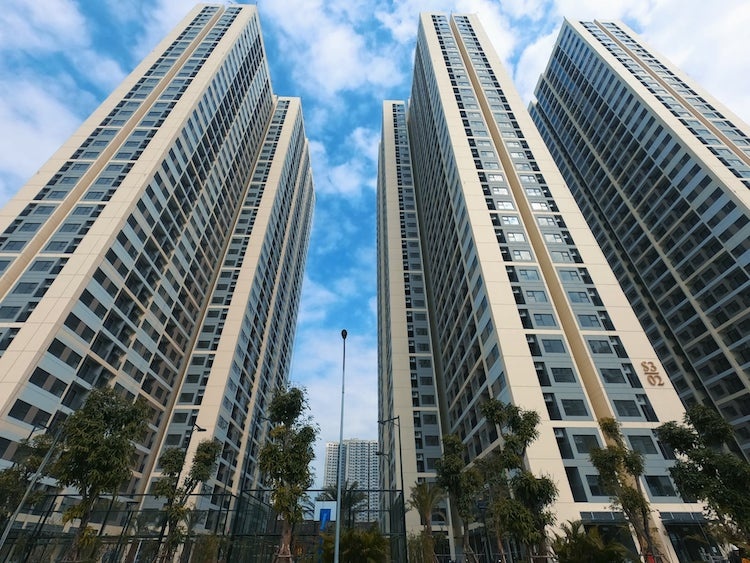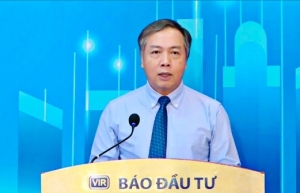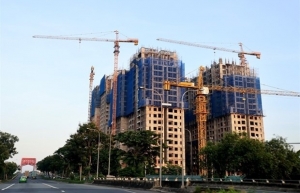Hanoi average property prices almost double since 2018
 |
Hanoi's real estate market recorded a notable uptick in the supply of residential properties in the third quarter of 2023, with over 1,800 units introduced. While this marks an 8 per cent increase compared to the previous quarter, it reflects a 36 per cent decline on-year.
This development comes on the back of a recent reduction in interest rates by the State Bank of Vietnam, creating better conditions for both investors and homebuyers to re-engage with the market. However, it is crucial to note that the total new supply during the initial nine months of 2023 has considerably diminished compared to the growth observed from 2020 to 2022.
According to a report by Cushman & Wakefield, the mid-range segment continued to dominate the supply influx during the quarter, accounting for nearly 85 per cent of the total. The majority of these new offerings stemmed from the subsequent phases of ongoing primary projects in Hanoi's western region.
In terms of sales, the third quarter saw an increase in the volume of residential units sold. Approximately 2,300 units were successfully transacted during this period, representing a 10 per cent increase compared to the previous quarter. Nonetheless, it signifies a 49 per cent drop on an annual basis, which can be attributed to the reduced lending rates.
Prominent sales were observed in projects located in Hanoi's western and suburban areas. Additionally, developments with well-managed construction progress, clear legal standings, and a wide array of amenities noted higher sales performance.
The report also notes that the average price of primary properties experienced a significant surge in the third quarter of 2023. Prices reached an average of $2,141 per square meter, marking a 5 per cent quarterly increase and nearly 12 per cent on an annual basis. This phenomenon is primarily driven by ongoing sales of mid-range projects with higher pricing points than the average primary residential offerings. Notably, the projects that experienced the most significant price hikes are primarily located in Hanoi's western districts, such as Cau Giay and Nam Tu Liem.
Cushman & Wakefield said that while there had been an improvement in demand from end-users, it was still in the process of recovery. The tightening of government credit policies and signs of economic instability, particularly in the latter half of 2022, have had an adverse effect on the real estate market. Recent governmental efforts to support the economy at large and the real estate sector, including continuous interest rate cuts and corporate bond restructuring, legal framework revisions, and other support measures, have helped alleviate some of the market's challenges.
In summary, there has been noticeable improvement, but full recovery has yet to be achieved. Residential sales in the first nine months of 2023 decreased by 44 per cent compared to the same period in 2022.
The market still requires additional time to overcome challenges such as credit shortages, bond defaults, and low liquidity in the market. In a competitive market environment where primary demand primarily stems from end-users, property developers have endeavoured to offer attractive and flexible sales policies to draw in and support buyers.
Looking ahead, Cushman & Wakefield anticipates that the majority of future housing supply will shift to suburban areas, in line with the growing trend of suburbanisation. In 2023, a total of 8,000 residential units are projected to be introduced, the lowest figure since 2018.
Due to land constraints in inner districts, the residential supply is expanding towards more remote areas, especially in the east. These areas have become destinations for large integrated urban areas, offering comprehensive facilities and convenient locations through key transportation projects like Ring Road No.4 and Ring Road No.3.
 | Proposed land law amendments seek to spur Vietnam tourism Some proposed changes aim to create a dedicated land fund for tourism development, improve land requisition rules, and strike a balance between national interests and the growing tourism sector, promoting infrastructure investments. |
 | VIR seminar addresses Land Law amendments VIR's seminar shed light on the challenges and the importance of well-defined legal frameworks for the tourism and resort real estate market, which currently faces deceleration despite substantial growth. |
 | Realty demand gains strength amid economic recovery The real estate sector is finally emerging from its slumber as the economic recovery in the third quarter of the year has triggered a resurgence of demand for realty properties. |
What the stars mean:
★ Poor ★ ★ Promising ★★★ Good ★★★★ Very good ★★★★★ Exceptional
 Tag:
Tag:
Related Contents
Latest News
More News
- An Phat 5 Industrial Park targets ESG-driven investors in Hai Phong (January 26, 2026 | 08:30)
- Decree opens incentives for green urban development (January 24, 2026 | 11:18)
- Public investment is reshaping real estate’s role in Vietnam (January 21, 2026 | 10:04)
- Ho Chi Minh City seeks investor to revive Binh Quoi–Thanh Da project (January 19, 2026 | 11:58)
- Sun Group launches construction of Rach Chiec sports complex (January 16, 2026 | 16:17)
- CEO Group breaks ground on first industrial park in Haiphong Free Trade Zone (January 15, 2026 | 15:47)
- BRIGHTPARK Entertainment Complex opens in Ninh Binh (January 12, 2026 | 14:27)
- Ho Chi Minh City's industrial parks top $5.3 billion investment in 2025 (January 06, 2026 | 08:38)
- Why Vietnam must build a global strategy for its construction industry (December 31, 2025 | 18:57)
- Housing operations must be effective (December 29, 2025 | 10:00)




















 Mobile Version
Mobile Version